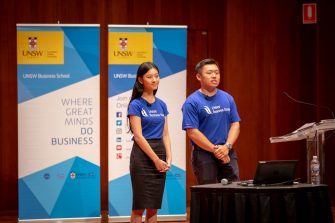Equity Diversity & Inclusion (EDI)

At UNSW Business School, equity, diversity, and inclusion (EDI) are core to our mission. We’re committed to creating a safe, respectful, and inclusive environment where everyone can thrive.
Equity, Diversity, and Inclusion at UNSW Business School
We are a community of educators, researchers, students, and partners dedicated to equity, diversity, and inclusion (EDI). We believe diverse perspectives drive innovation and help solve complex global challenges.
Our culture is built on respect, opportunity, and inclusion—creating a place where everyone feels valued and able to thrive. We aim to set the standard for inclusive practices in education, research, and society.
Through teaching, research, and partnerships, we empower people to reach their potential and contribute to a fairer, more sustainable future. Guided by UNSW’s Progress for All Strategy, we work to remove systemic barriers and embed EDI into everything we do, preparing our community to lead with integrity and create positive change.
EDI Priorities Pillars
-
Business School Outreach Initiatives
Discover UNSW Business School’s Outreach programs. Designed to inspire future leaders, foster inclusive opportunities, and connect students with real-world business experiences. Whether you're curious about entrepreneurship, leadership, or social impact, there's a pathway waiting for you.
Indigenous Engagement
In collaboration with Nura Gili, community voices, and industry leaders, UNSW Business School offers programs that foster a welcoming and empowering environment for Indigenous students. These initiatives are designed to celebrate culture, build confidence, and open pathways into the world of business.
-
Business School Faculty Programs
Explore the initiatives supporting our faculty’s professional development, wellbeing, and inclusive teaching practices; building a culture of equity across every discipline.
-
UNSW Western Sydney Connect
The UNSW Western Sydney Connect: Growing Together initiative connects education, research and industry, offering a platform for collaboration, career development, and knowledge sharing through workshops, panel discussions, and networking.
-
Business School's Commitment to SDGs
UNSW's commitment to the Sustainable Development Goals (SDGs) provides a platform for our faculty to integrate sustainable thinking across our curriculum, education platforms, academic research, and external engagement activations.




